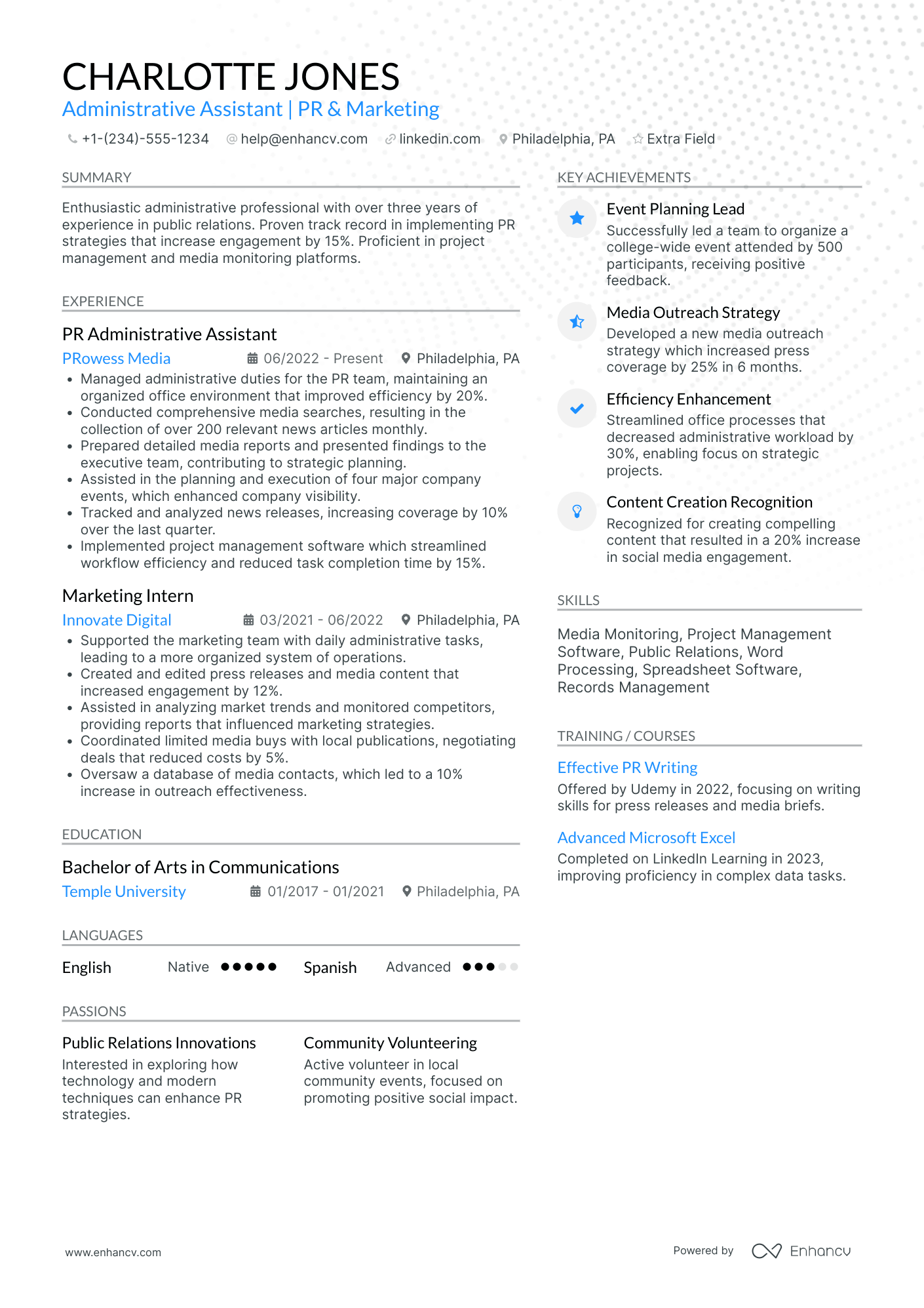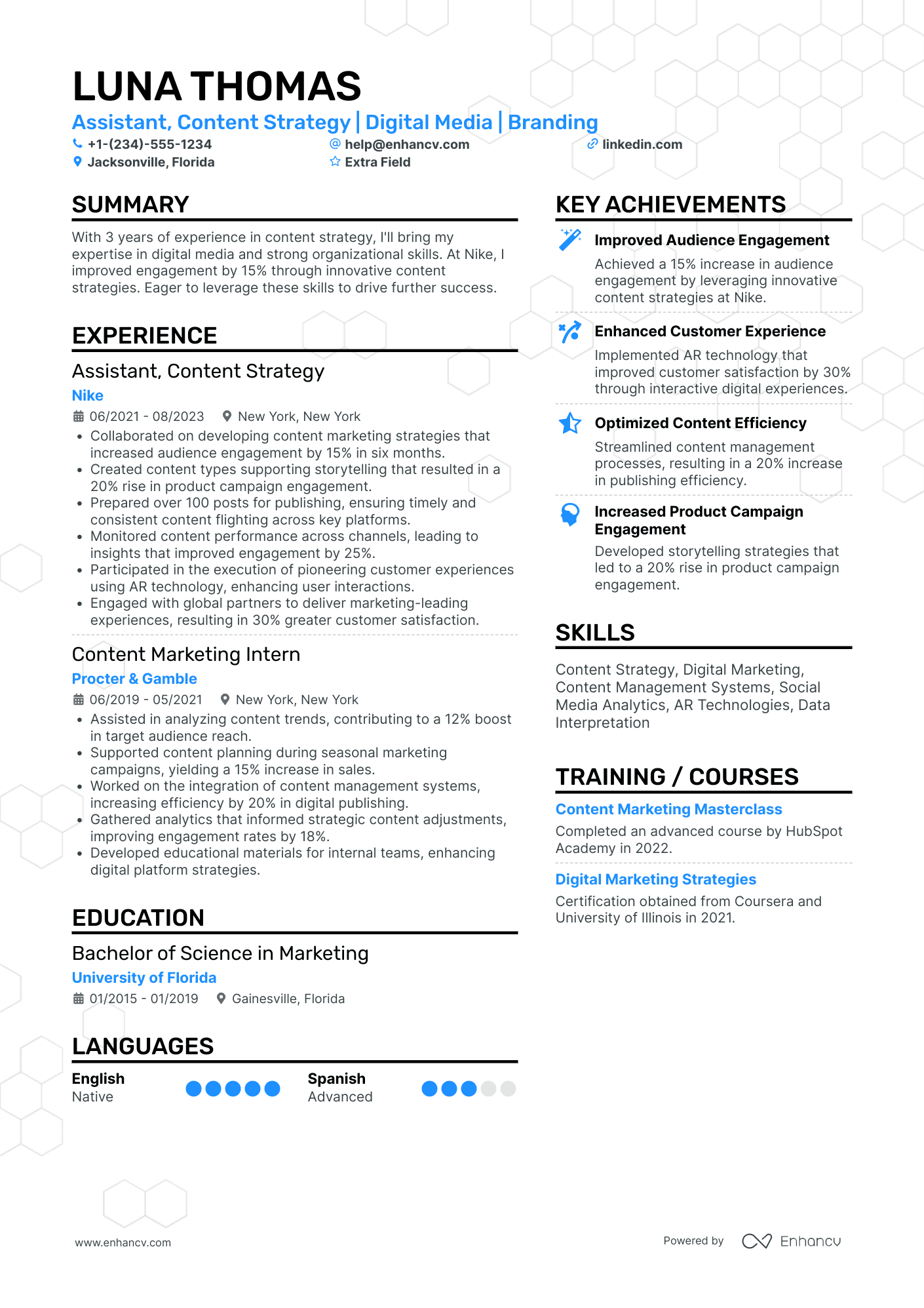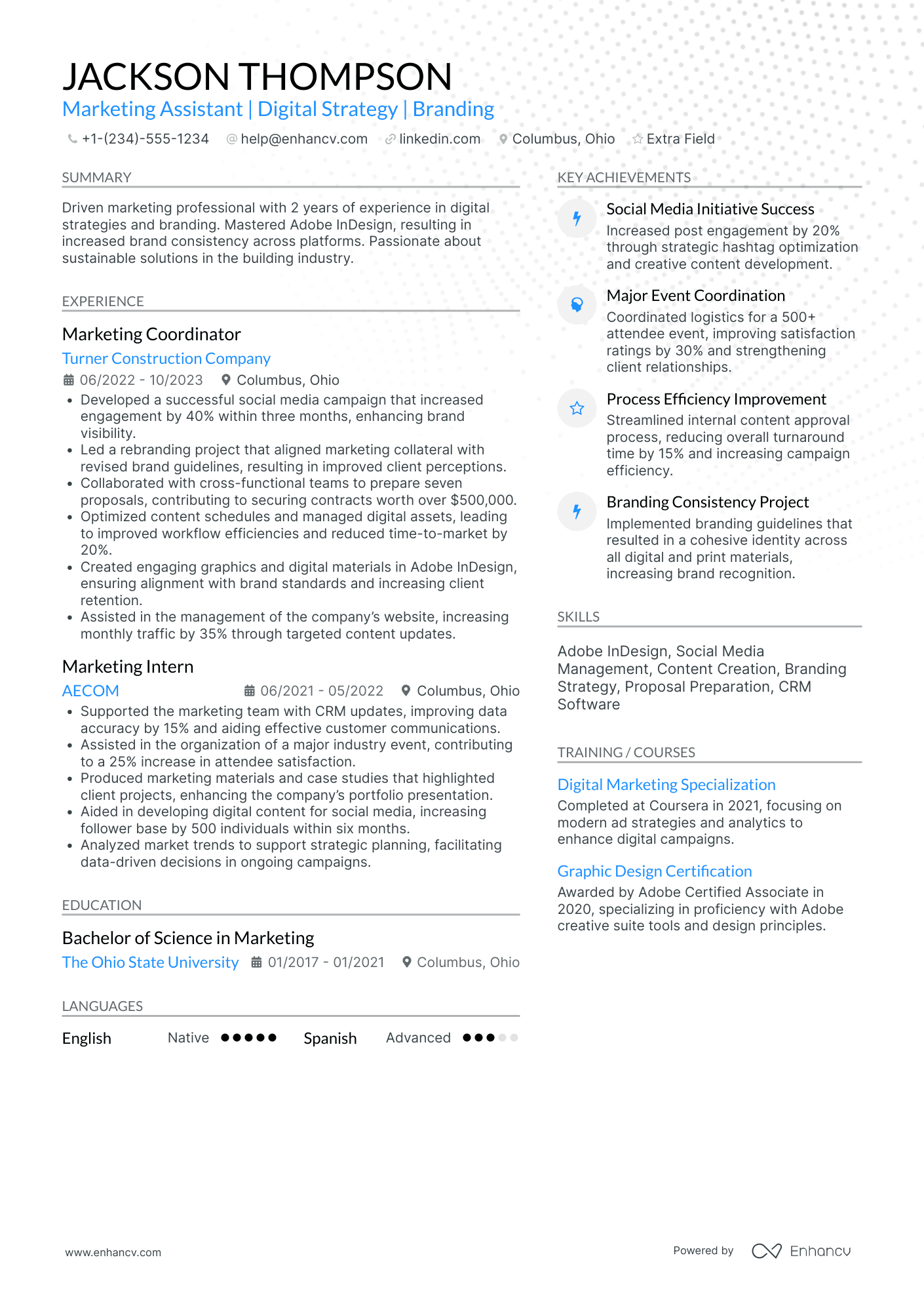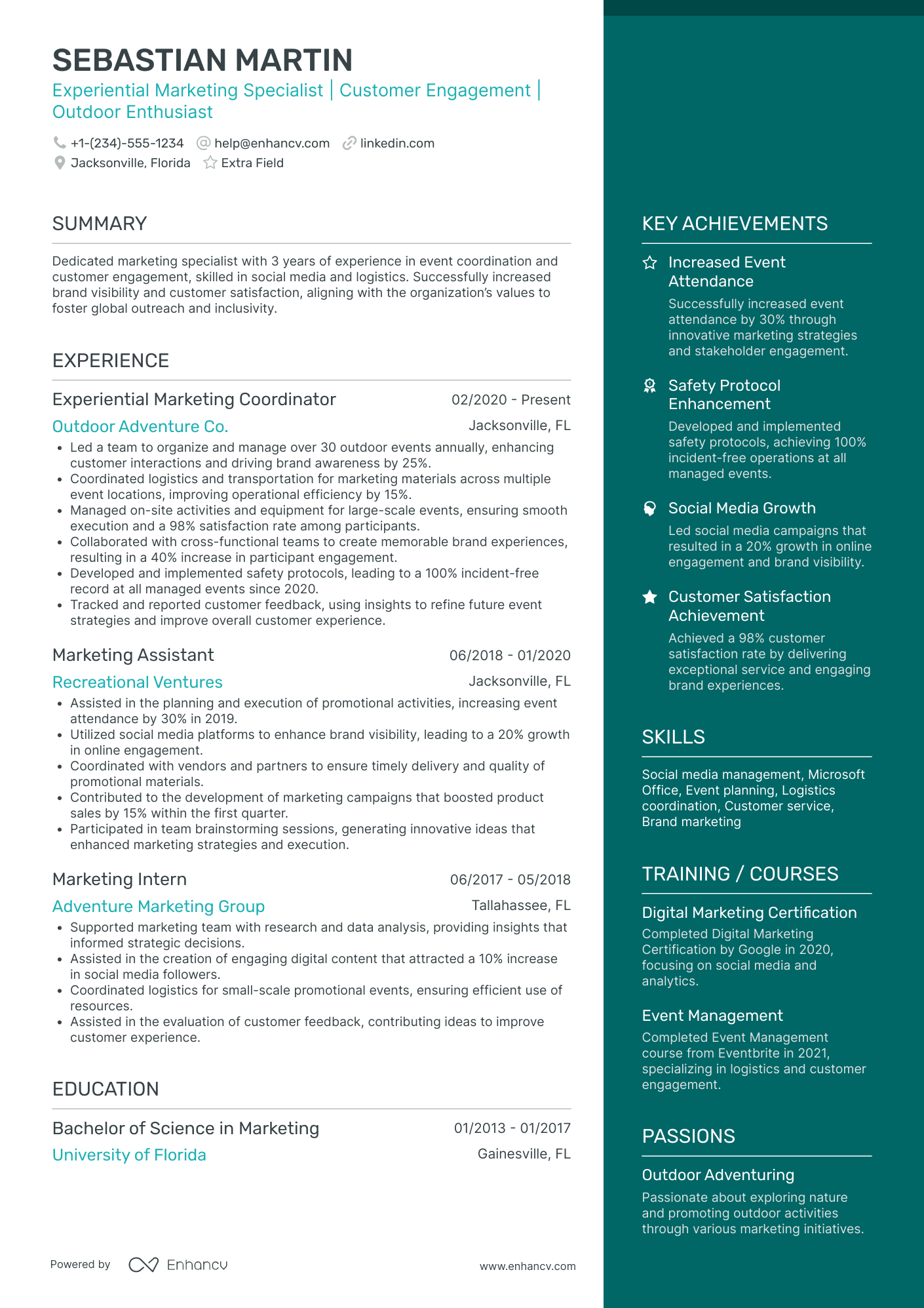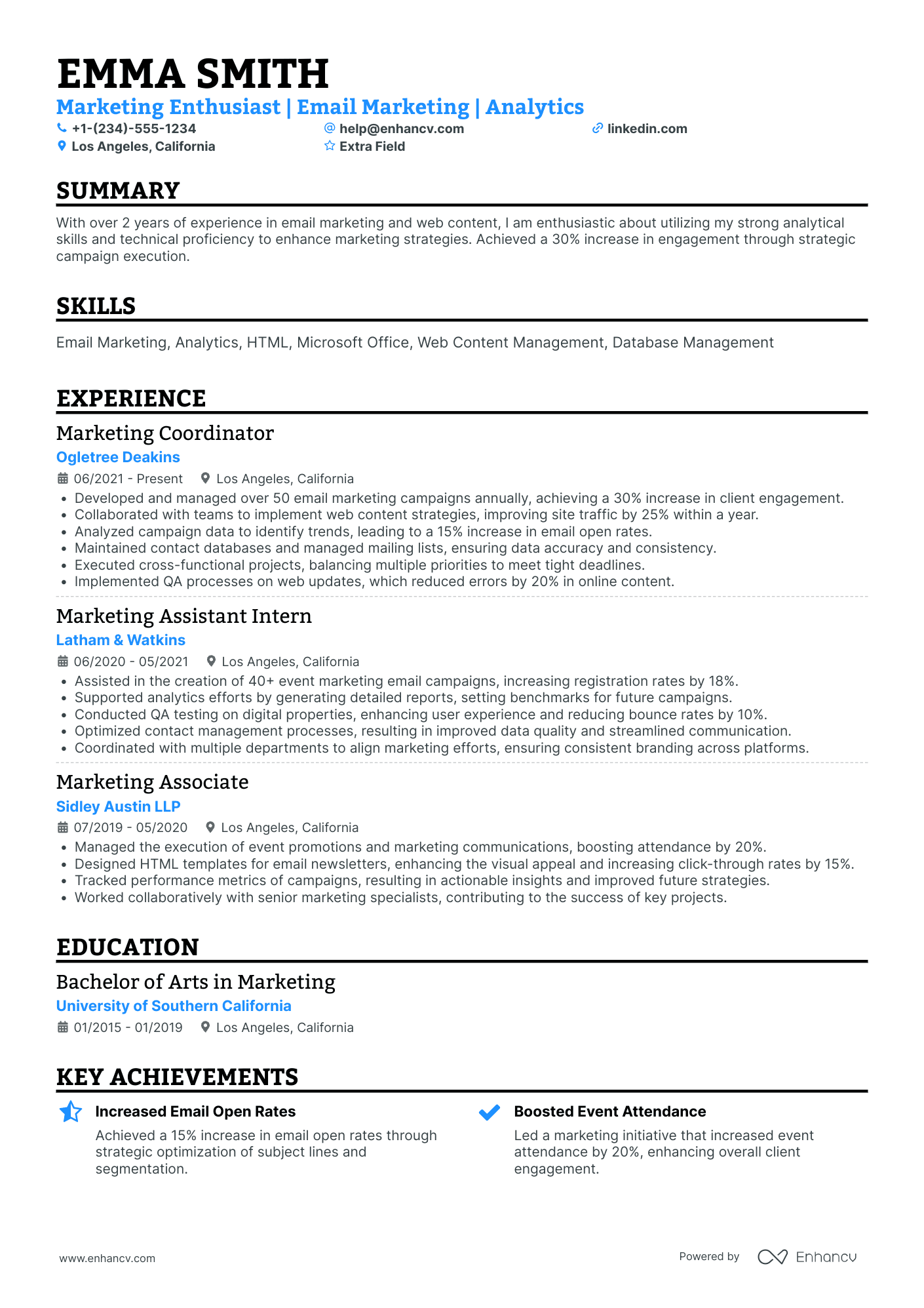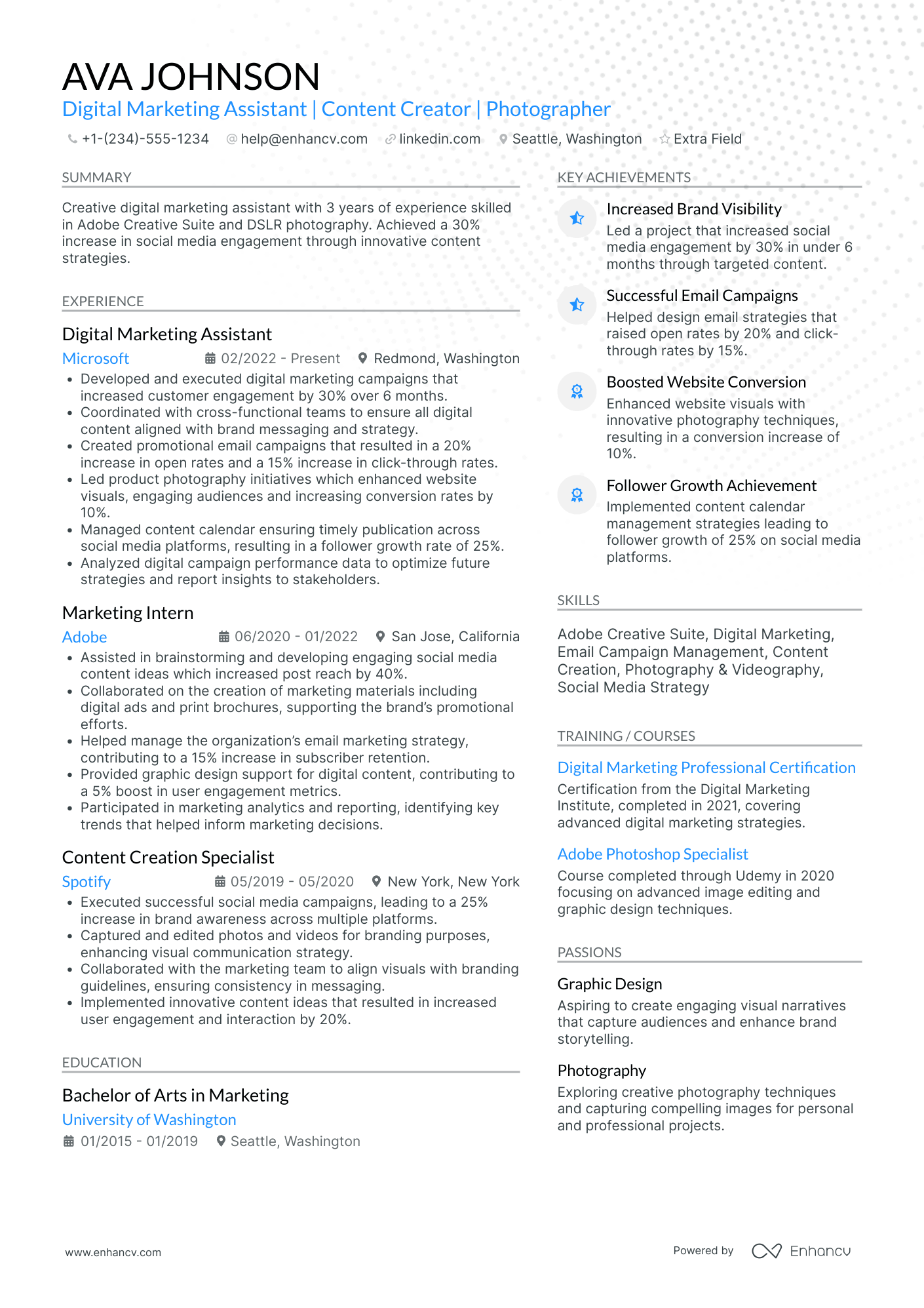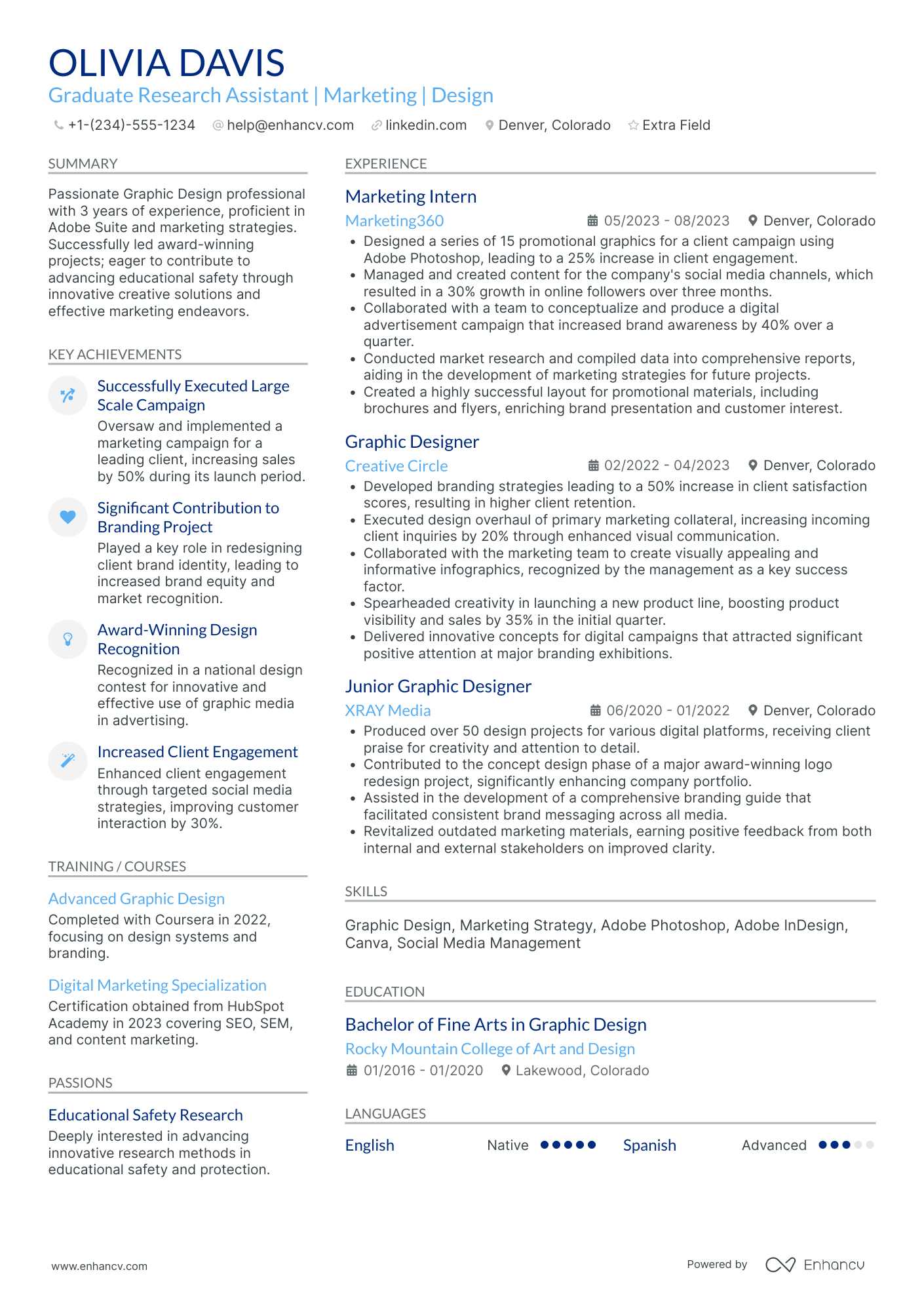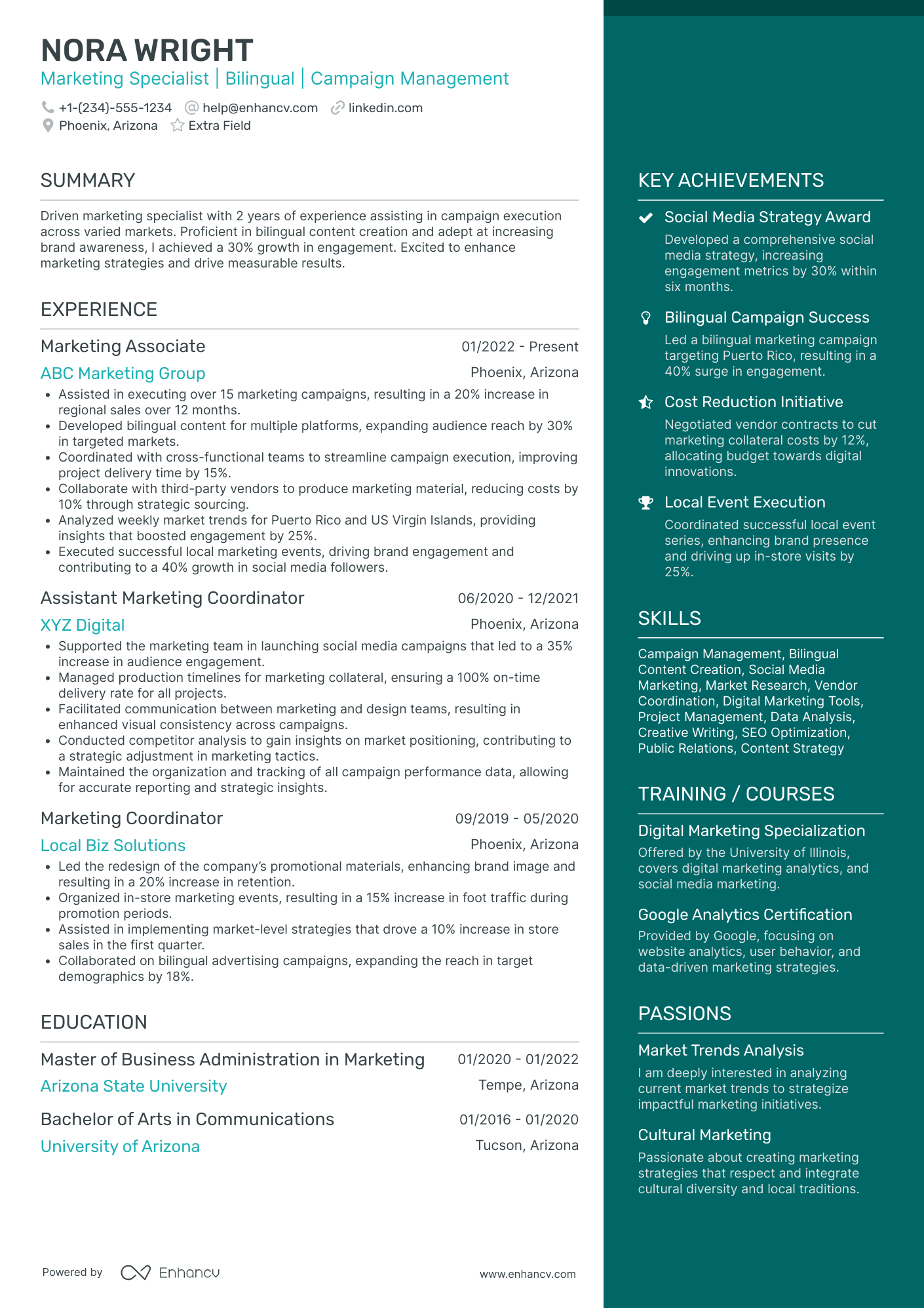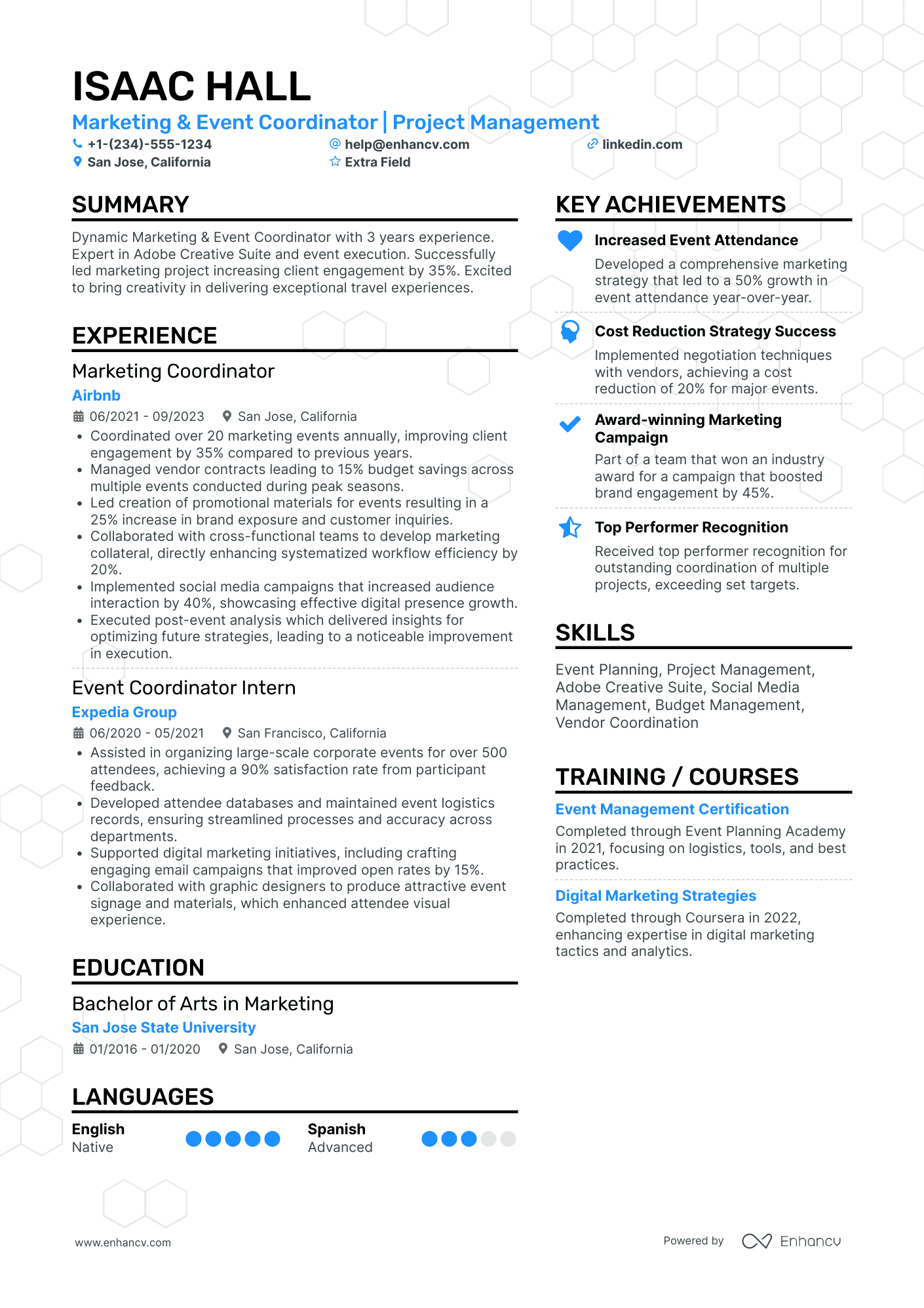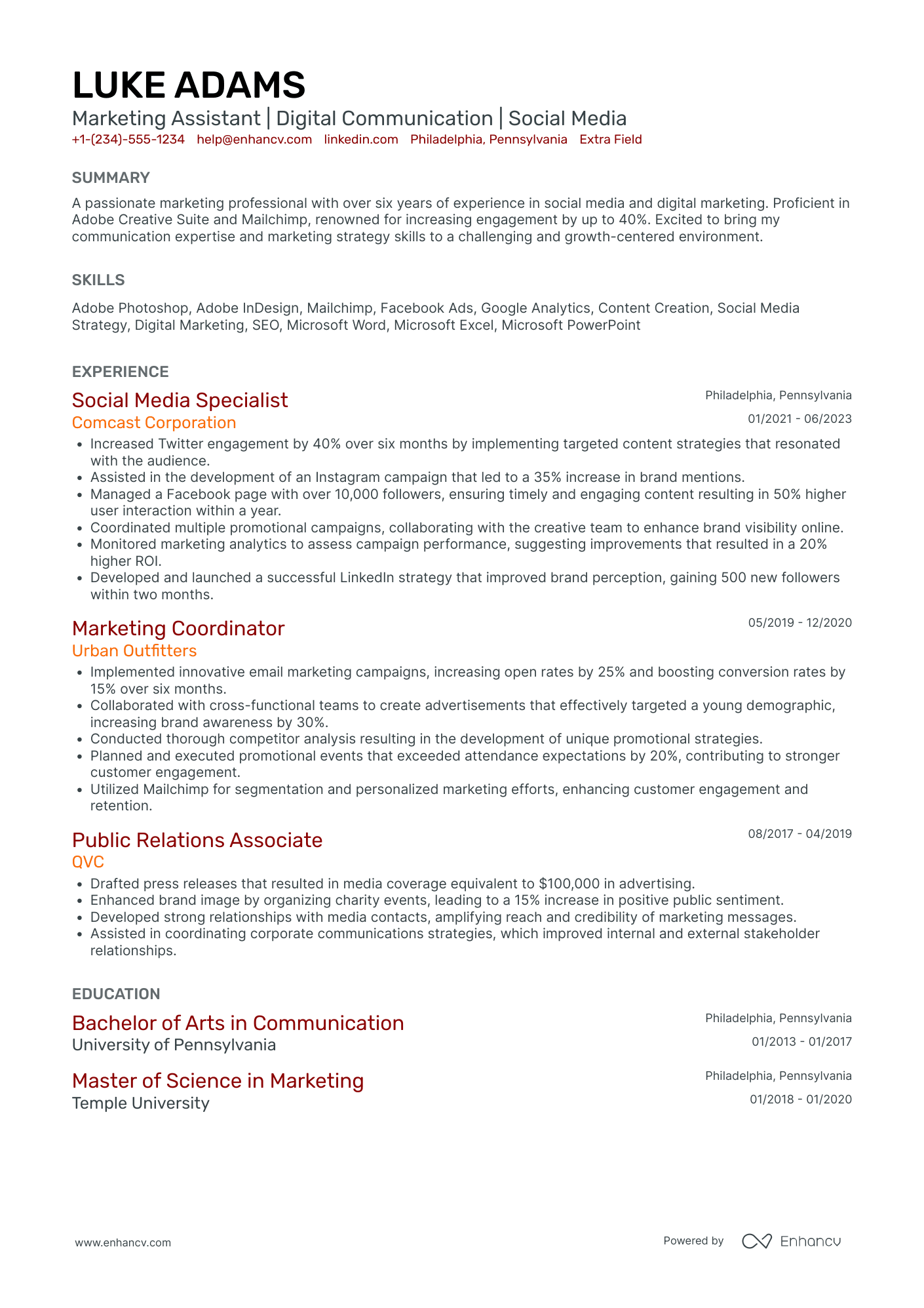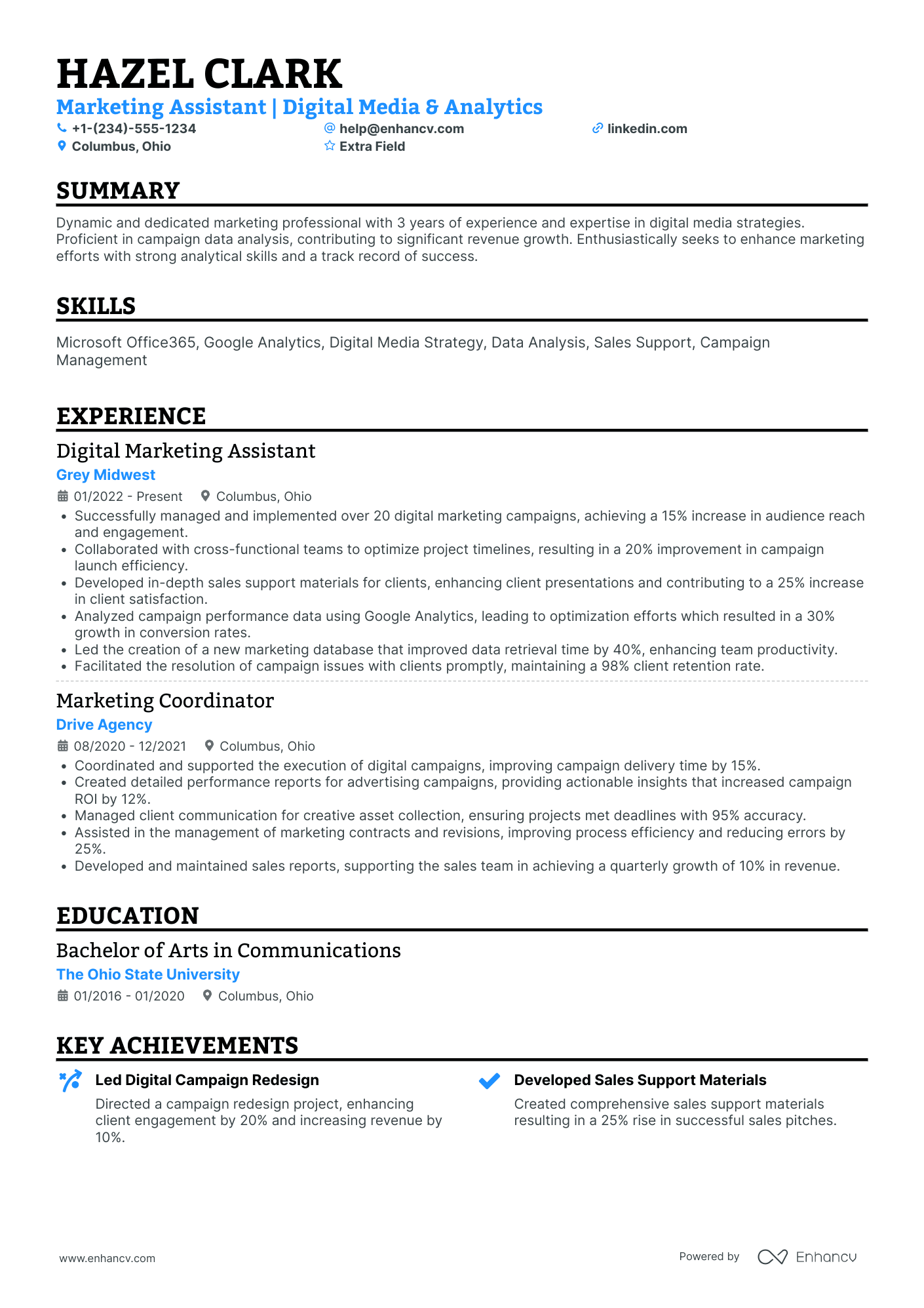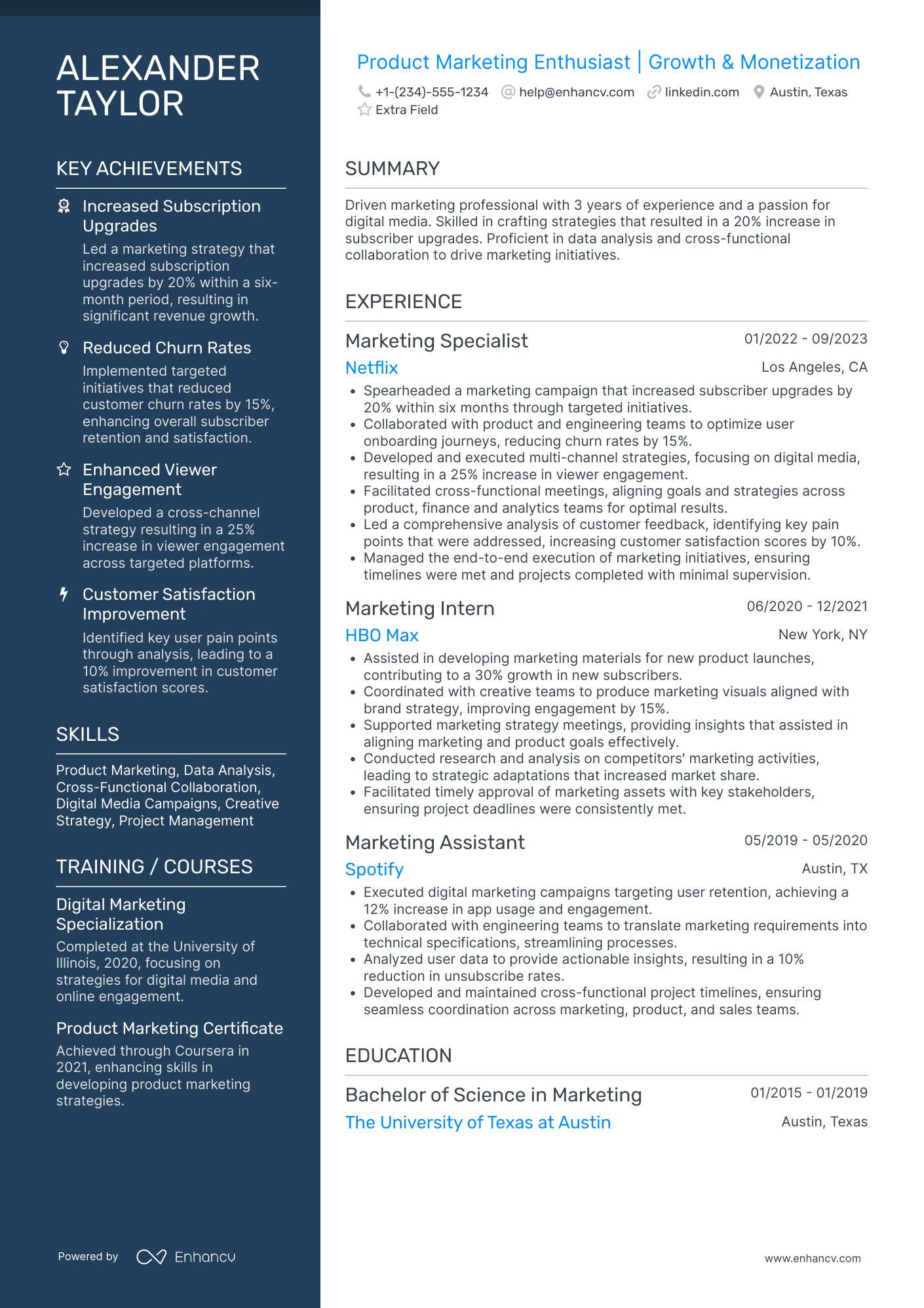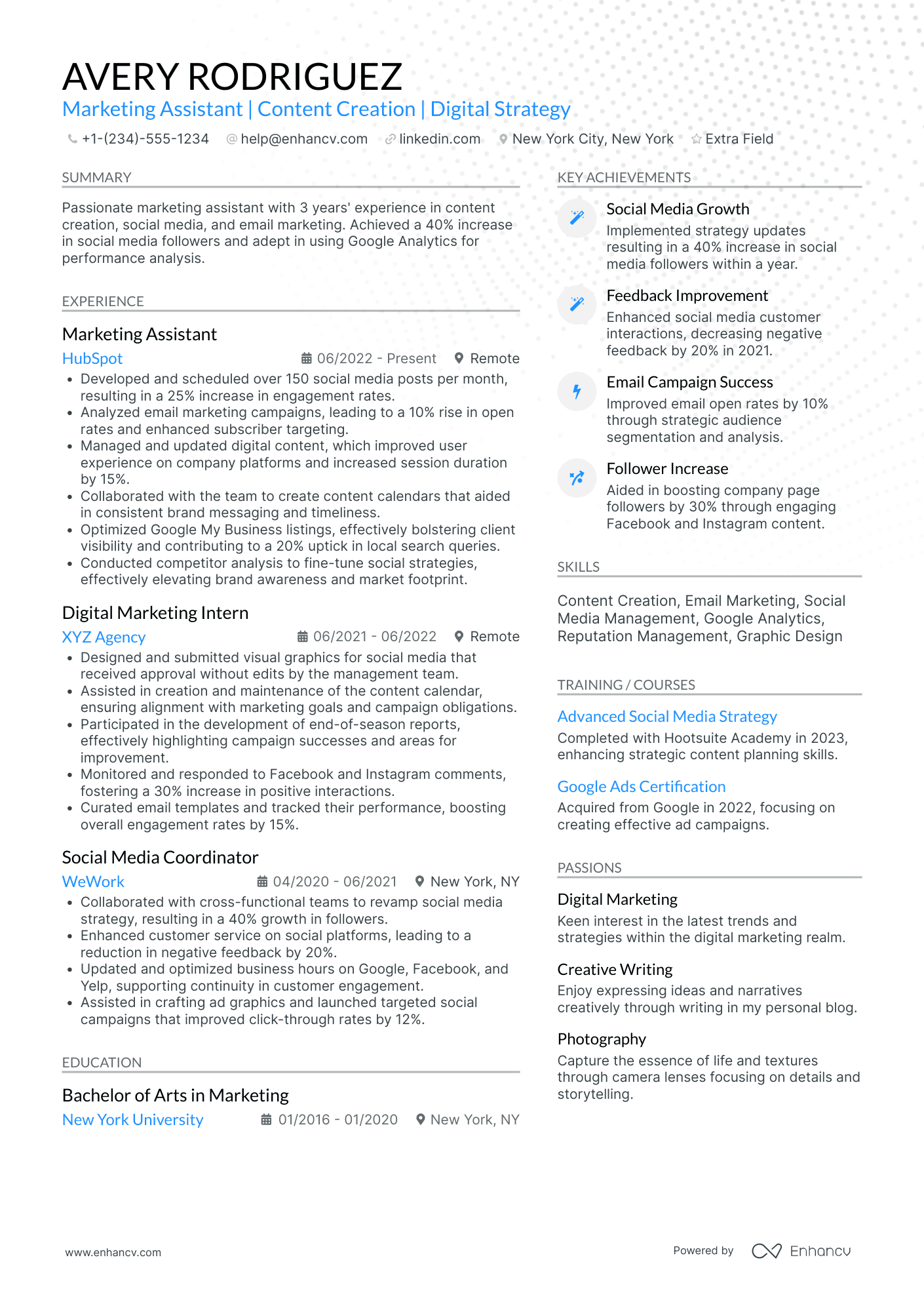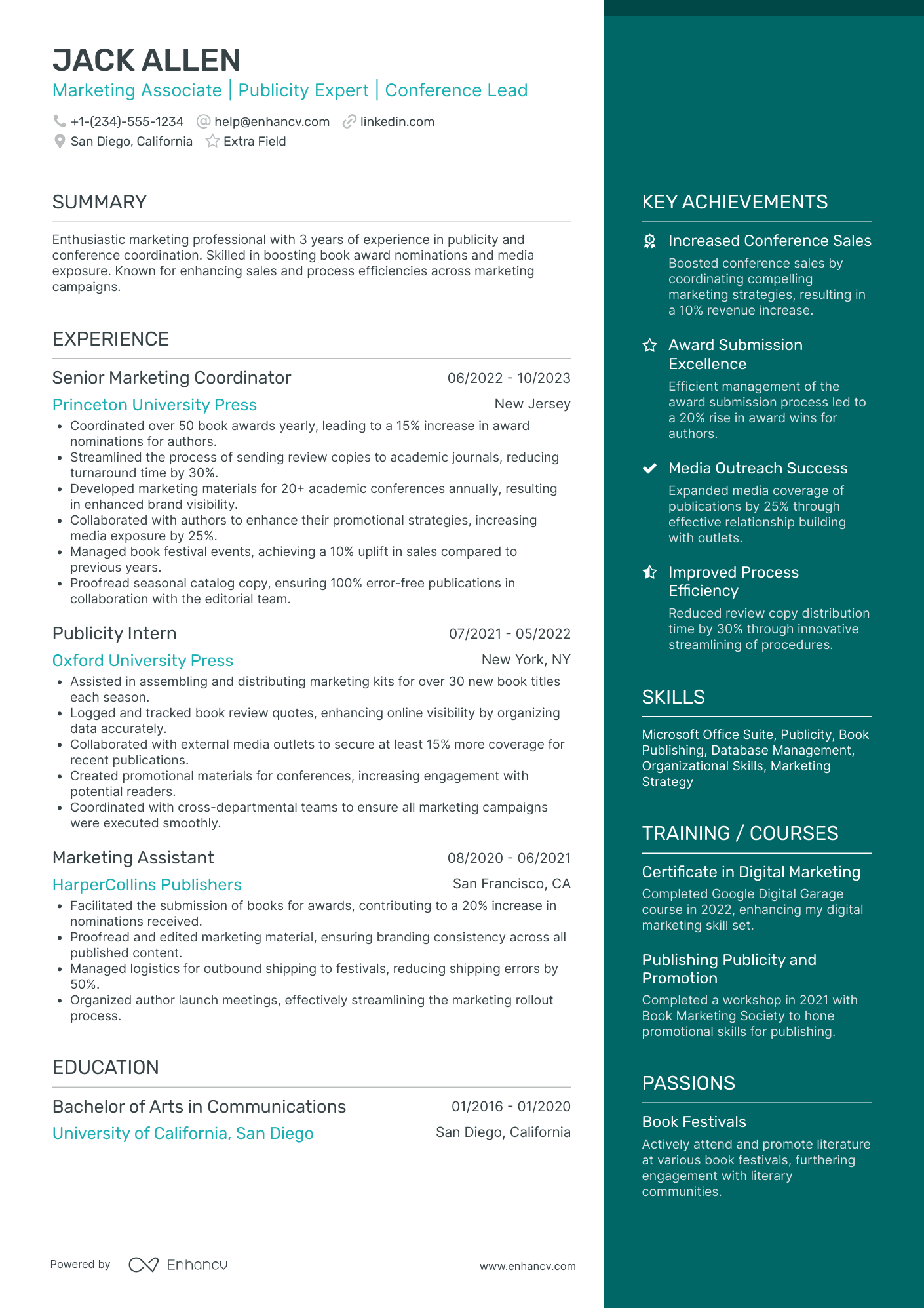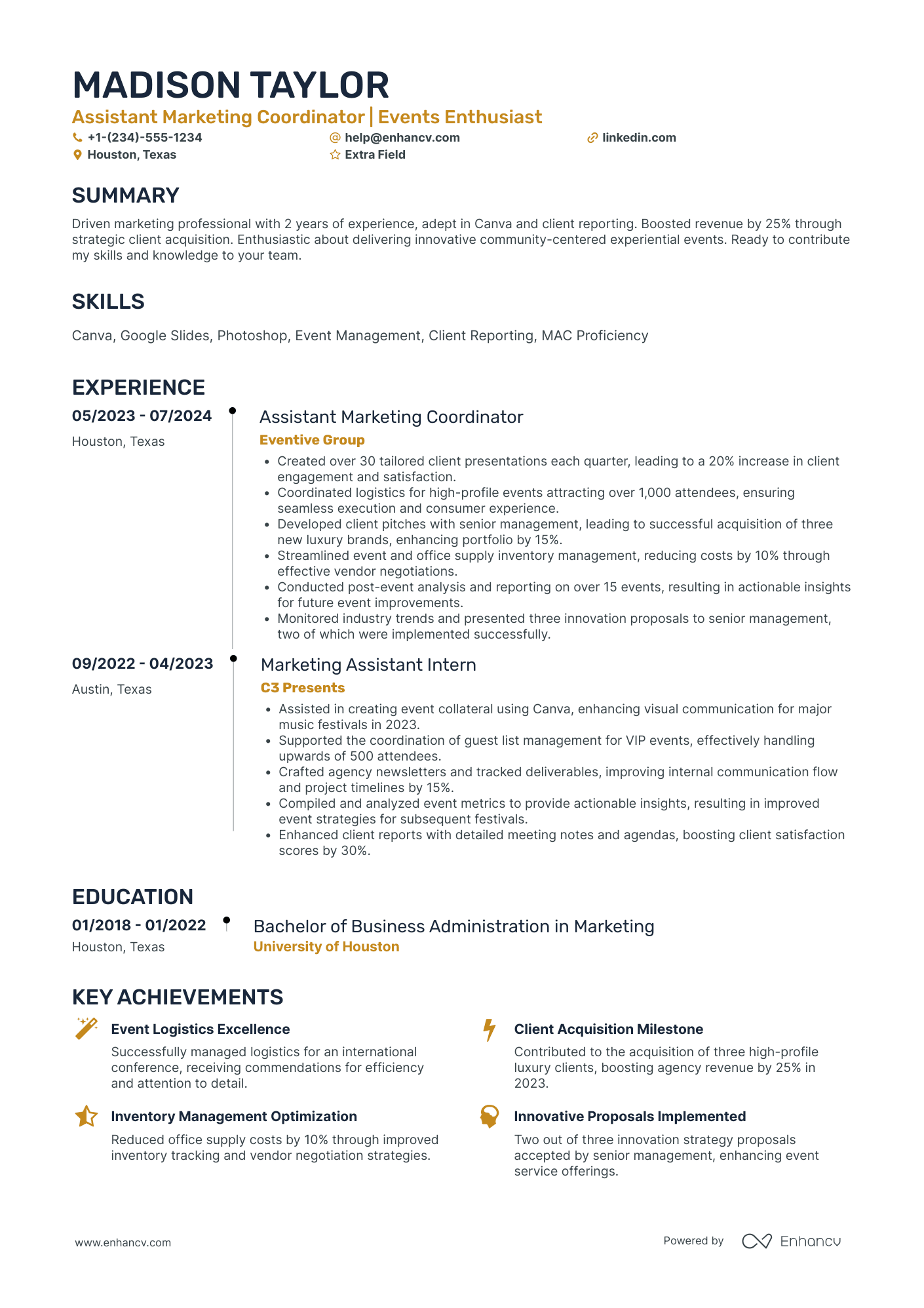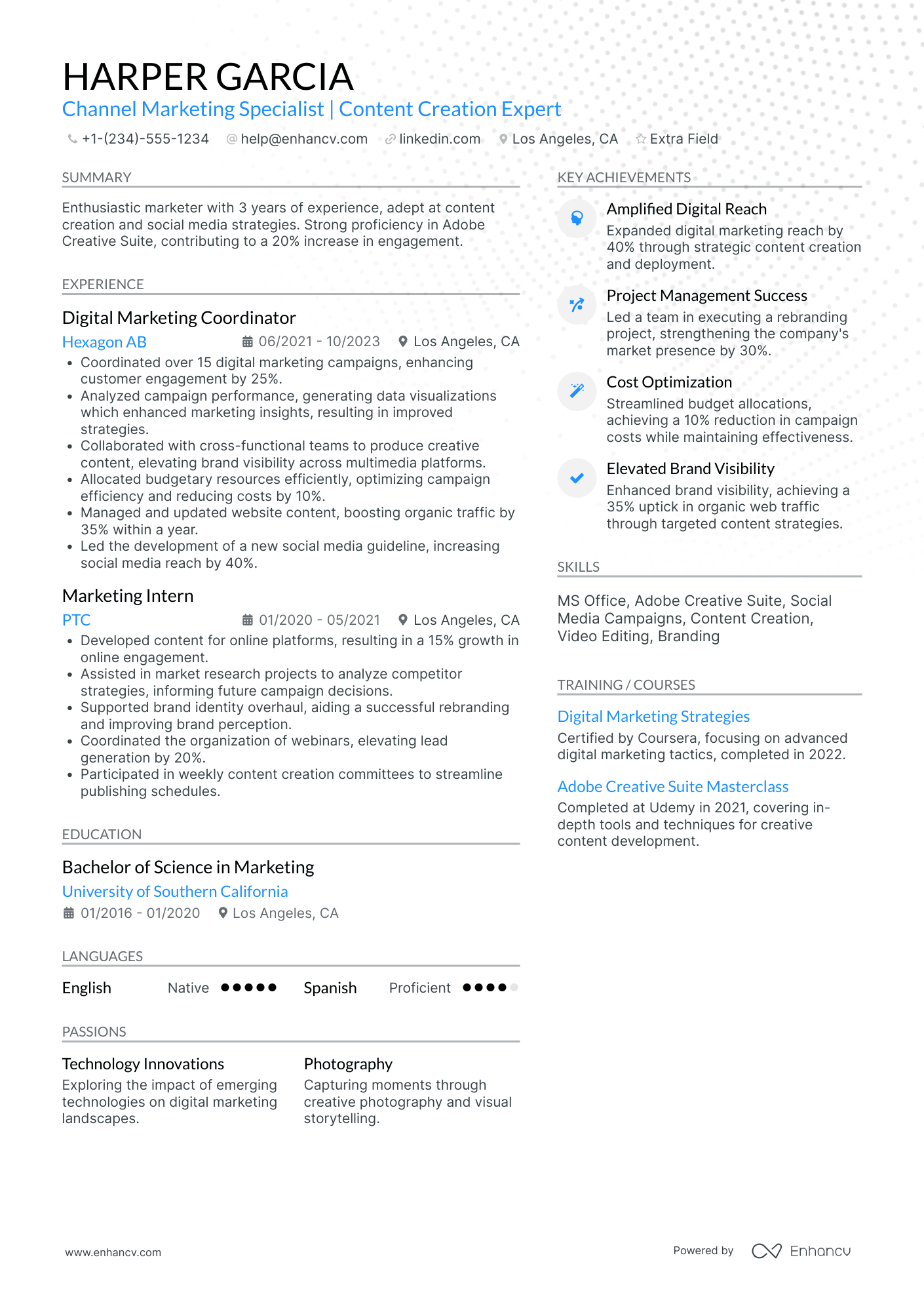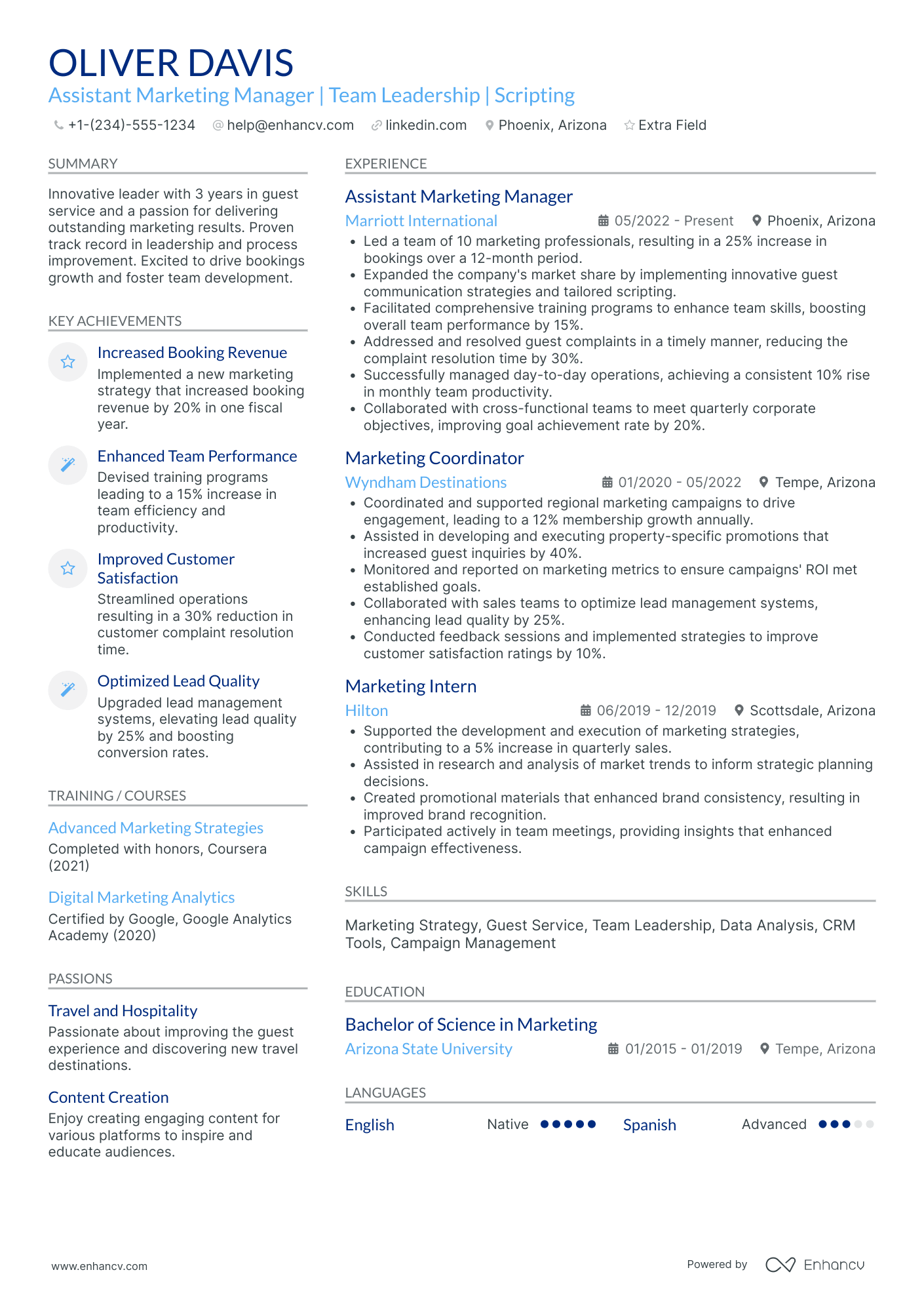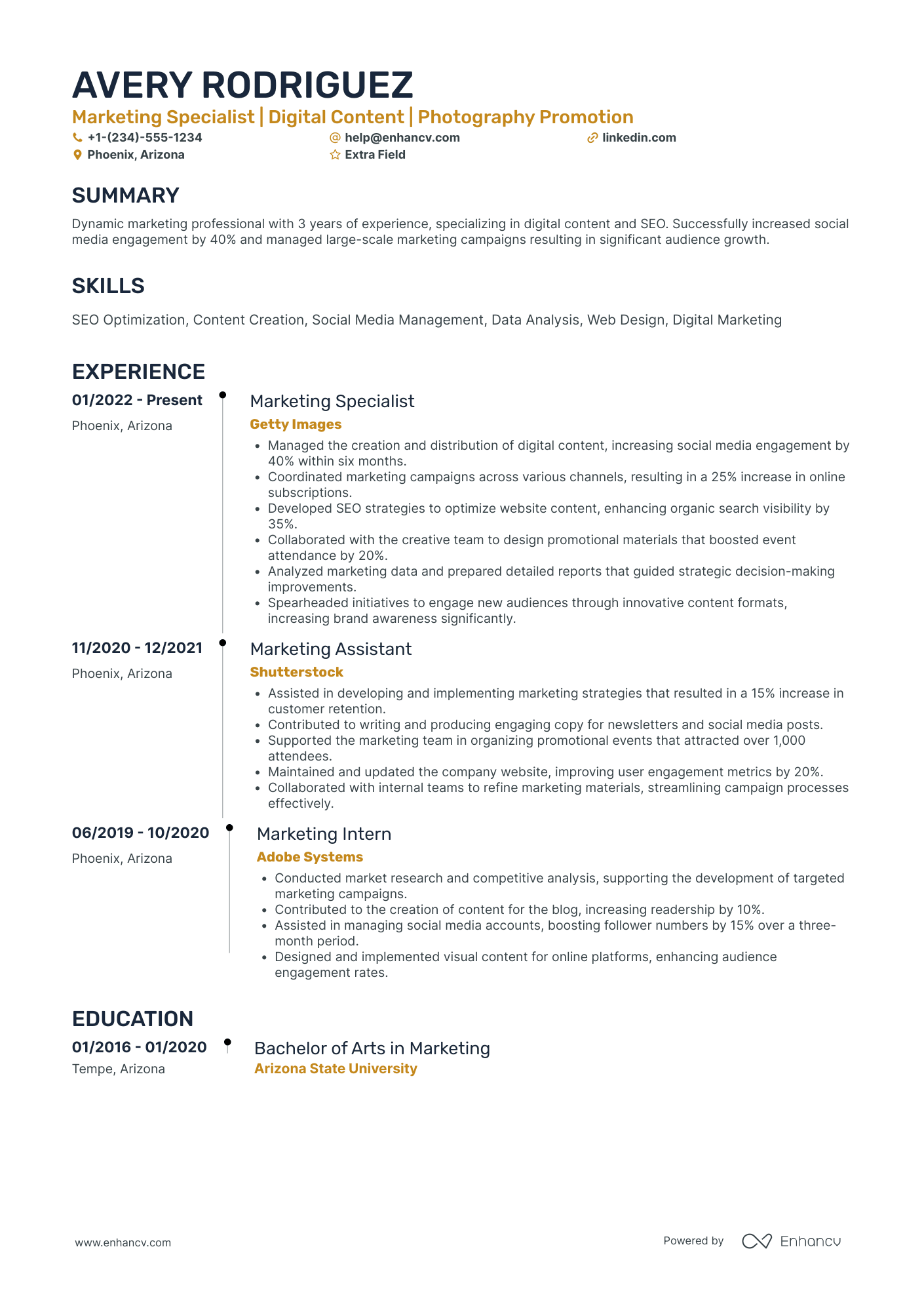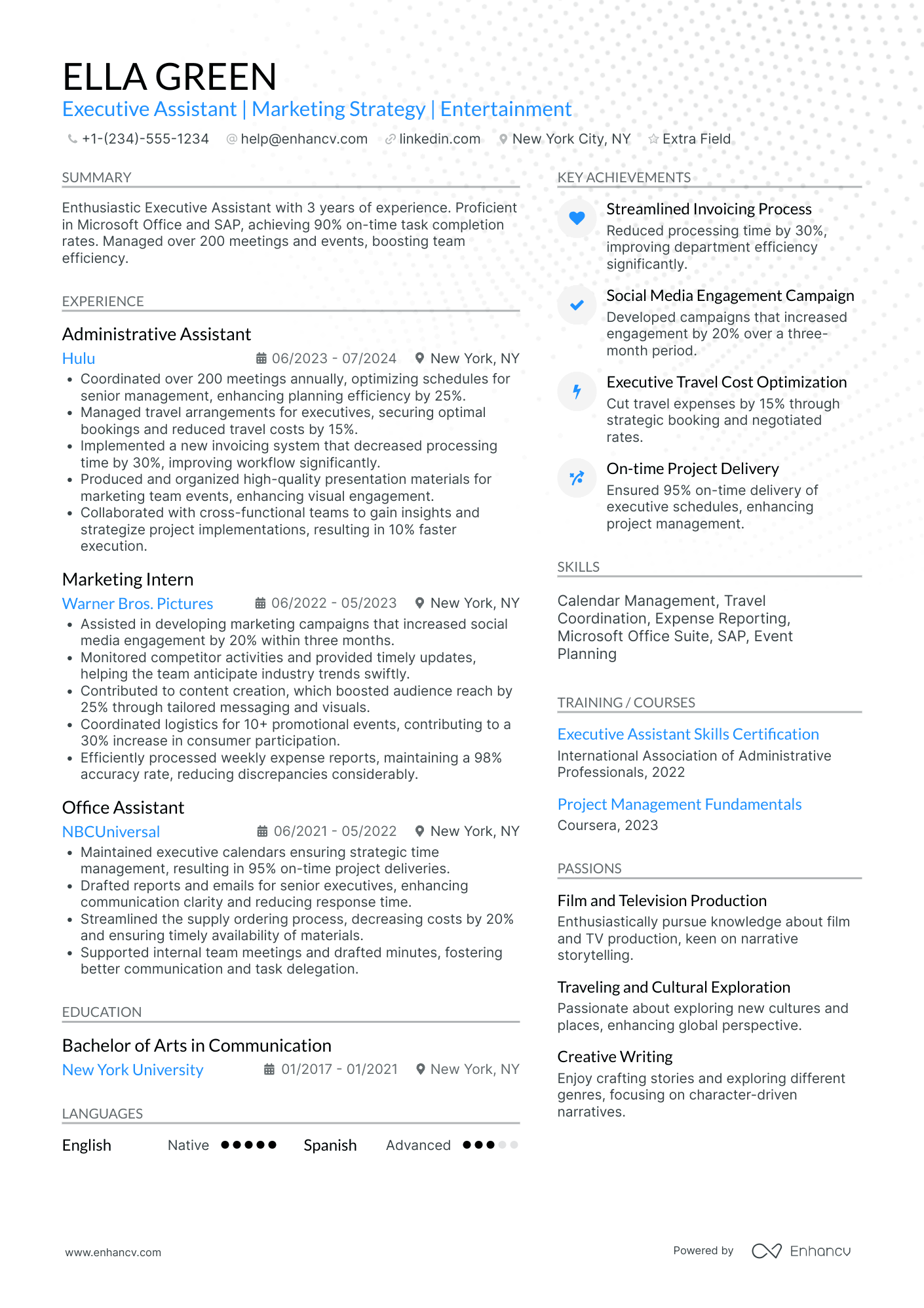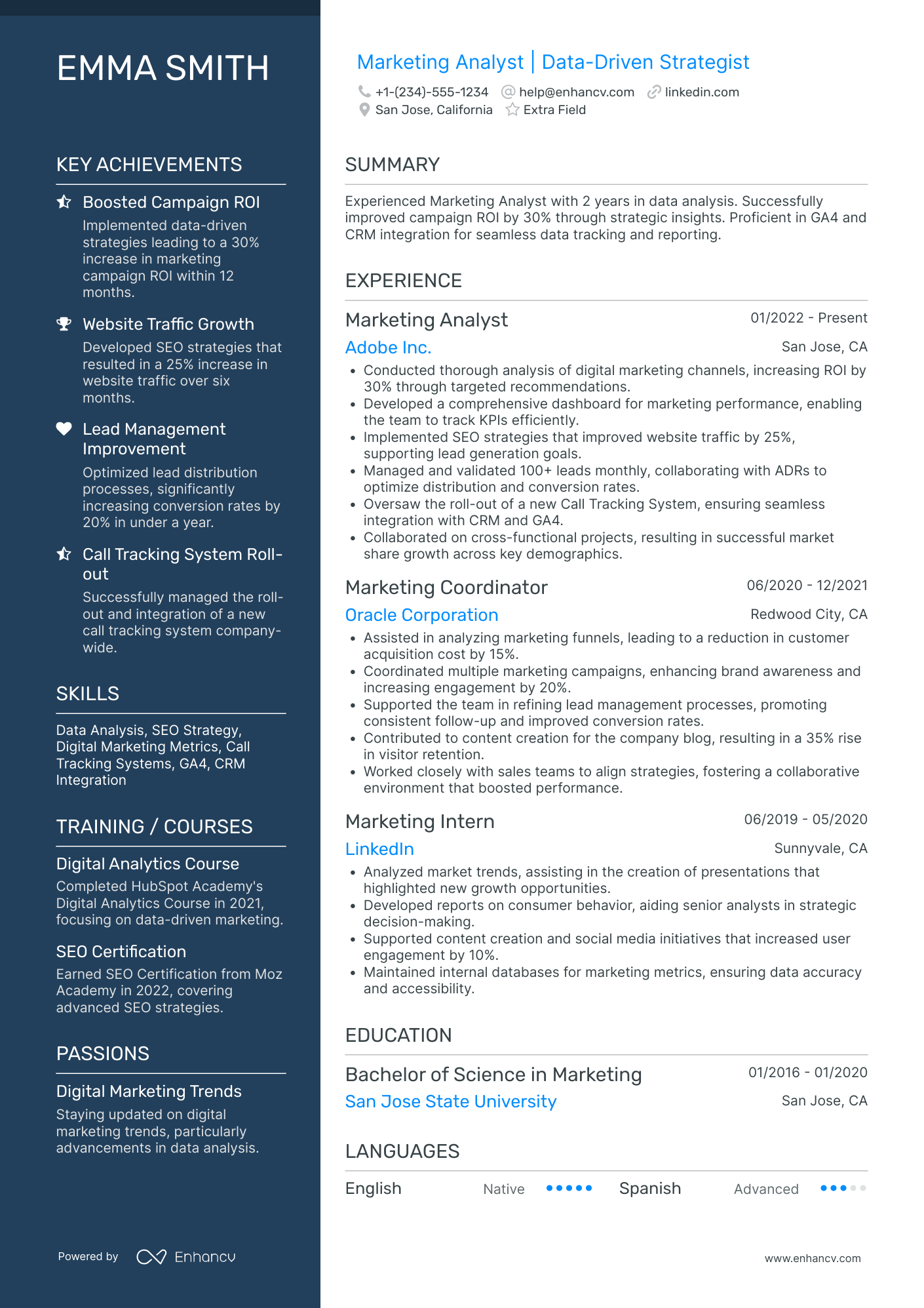No two marketing assistant positions are the same, both in terms of job responsibilities and industry expertise. That’s why recruiters pay special attention to how candidates present their experience, as well as how relevant it is to the offered position.
The key to getting hired is creating an organized and informative marketing assistant resume that is tailored to the company’s needs and goals.
In this guide, we’ll help you understand how to:
- Demonstrate knowledge of current marketing trends;
- Incorporate names of tools and platforms you have experience with;
- Mention the business niches you’re expert on;
- Take advantage of this article’s real marketing assistant resume examples.
For more advice on how to make it as a marketing specialist within a specific industry vertical, be sure to check out our other guides:
How to format a marketing assistant resume
A true marketing expert is always conscious of what their target audience wants to hear and when it's appropriate to engage it.
As a marketing assistant, most of your responsibilities will revolve around coordinating, managing, and in some cases delegating tasks. And your duties will cover more than just your clients and their customers. You’ll have to work cross-functionally. The key is having clear work processes and maintaining open channels of communication.
The same logic applies to your marketing assistant resume - you must demonstrate how your experience relates to the available position and what benefits you can bring if hired.
To do this, you must create a good foundation on which to build your resume. Here are some factors to take into account before you begin:
- Select the reverse-chronological resume format, if you’re an experienced specialist: This tried and tested resume layout is recruiters’ favorite, because it best outlines a candidate’s career progression. It also showcases the range of their expertise and abilities.
- Pick the hybrid resume format, if you’re an SME (subject-matter expert), but don’t have much marketing experience: Being an SME doesn’t mean you can’t assist other marketing specialists by informing them of niche trends and factors. This resume template will allow you to emphasize your industry expertise and transferable skills.
- Don’t forget to list your portfolio and social media profiles in the resume header: Not only will this give hiring managers a better idea of what personally interests you as a marketing professional, but it will also provide them with more methods to get in touch with you.
- Be selective with the certificates you share: It’s essential to list your most pertinent qualifications first to show your ability to work with company-specific tools and platforms. Add bonus certificates only if you have enough space left on your resume.
- Make certain that you mention the tools you specialize in: While there is a separate section to describe all your marketing skills, highlighting how you’ve used them to achieve particular marketing goals in the experience section is much more valuable to hiring managers. Recruiters must determine whether your work approach applies to the context of the company they represent.
- Emphasize your creativity by opting for a stylish design: In marketing, appearances play a crucial role when guiding customers on their buyer’s journey. You don’t have to choose a wild design to impress recruiters, but adding a splash of color can help get your message across.
- Demonstrate your knack for creating a great user experience by choosing a tidy font: There are many serif and sans-serif fonts, such as Montserrat and Lato, that you can use. All of them are ATS (Applicant Tracking System) friendly. So, you don’t have to stick to the generic (and overused) Arial and Times New Roman.
- Choose a two-page resume template, if it’ll portray your experience better: There’s nothing wrong with going over the traditional resume limit of one page. However, ensure that whatever information you include is relevant to the offered marketing assistant role.
- Preserve the design and style of your resume by saving it as a PDF file: Don’t risk losing any customizations you’ve done to your application by relying on recruiters having the same device settings as yours.
Think about the market’s preferences – a Canadian resume, for instance, could have a different layout.
Make your resume more appealing to recruiters by running it through our intuitive AI resume checker — it will evaluate your resume on 16 essential points for free and give you tips on what to improve.
Is your resume good enough?
Drop your resume here or choose a file. PDF & DOCX only. Max 2MB file size.
Once you modify your marketing assistant resume template to suit your experience and preferences, you can move on to dividing the remaining space into various sections.
Begin by incorporating the essential ones first:
The top sections on a marketing assistant resume:
- Contact information: Make it easy for recruiters to reach out to you for any further discussion.
- Objective statement: Showcase your career goals and how they relate to the specific marketing role. This helps with creating a personal connection with the reader.
- Skills section: Cater to the need to highlight vital marketing-related skills such as project management, SEO/SEM, and social media expertise.
- Work experience: Demonstrate your practical experience in the marketing industry by exhibiting your competence and growth.
- Educational qualifications: Validate your foundational knowledge in marketing and related fields by adding credibility to your candidature.
These sections cover the most fundamental aspects of your career. You can always add extra segments to your resume, provided:
- It allows you to share achievements that are difficult to fit into any of the other categories.
- The listed information is pertinent to the position.
Speaking of relevancy, it’s vital to understand what type of details hiring managers are looking for on your resume.
The perfect marketing assistant candidate has to display:
What recruiters want to see on your resume:
- Experience with CRM software: Recruiters prioritize this as it shows the candidate is capable of managing customer relations and databases effectively.
- Understanding of digital marketing channels: This is valued as it signifies competency in using different marketing channels, which is crucial for the role of a marketing assistant.
- Good communication skills: Recruiters prioritize this as the role requires constant communication with various stakeholders within and outside the organization.
- Creativity and adaptability: These skills are often highly valued in marketing roles as they indicate the ability to think outside the box and adapt to changing market conditions or trends.
- Experience with market research: Prioritizing applicants with this experience can reassure recruiters that the candidate has strong analytical skills and understands the market the company operates in.
How to write your marketing assistant resume experience
The experience section on your resume serves to describe your work history through the challenges you’ve tackled and the goals you’ve achieved. As such, the focus of each entry should be on the growth of your expertise and the skills you’ve acquired along the way. Not on your day-to-day activities.
A common mistake we see with lots of resumes is the “to-do” list approach. This happens when an applicant has listed all of their duties and responsibilities under each respective position. While these can partially indicate professional growth, they are not enough to vouch for your expertise as a marketing assistant. To avoid this, think about the achievements you want to add to your resume. Trace which skills have helped you accomplish your goals and incorporate them in the entry.
For example, if you want to demonstrate your proficiency with Google Analytics, you can talk about how you helped clients draw insights from the data in their platform accounts.
But before you start randomly listing achievements, consider what’s requested in the job ad. Carefully make note of the resume keywords that point to the main competencies you have to cover. Then, recall a success story that best describes how you excel at that particular skill.
When listing your achievements, make sure to:
- Begin eachbullet point with an action verb, pointing to the problem you solved.
- Mention the tools and software you’ve used to resolve the issue.
- Cite any pertinent data that illustrates the results of your work and the scale of your success.
Have a look at the marketing assistant experience section example below:
- •Decreased the overall annual cost per lead by $31,000 for 2021.
- •Substituted 10 metric tracking and visualization tools with 4 new ones.
- •Designed and executed 7 Thanksgiving and Christmas social media marketing campaigns.
The applicant does well to start each line with an action verb. However, the bullet points could have been framed better:
- The first entry highlights the result of the candidate’s work, but not how the outcome was achieved or who was affected by the decrease in costs.
- The second line doesn’t explain why the tool substitution was necessary and what was accomplished as a result.
- The third bullet point doesn’t clarify what was the bottom line, following the end of the campaigns.
On top of these errors, the applicant hasn’t taken full advantage of the company description section. Hiring managers want to confirm that you’re up-to-date with trends in the vertical their company operates in. The best way to indicate the industries you’re familiar with is to mention the type of clients your past employers do business with.
Here is how to incorporate all the missing information:
- •Decreased the overall annual cost per lead by $31,000 for 2021 for 3 of Aware's clients within the lifestyle vertical by incorporating a mix of marketing tactics.
- •Achieved a $25,000 reduction in monthly costs after substituting 10 metric tracking and visualization tools with 4 new ones and automating 8+ processes.
- •Designed and executed 7 Thanksgiving and Christmas social media marketing campaigns, which raised a total of $730 million in revenue.
Now recruiters know that the applicant:
- Has plenty of social media marketing experience.
- Is good at budgeting and optimizing expenditures.
- Is a tech-savvy problem-solver who can flaunt their achievements without divulging unnecessary details.
One factor to be mindful of is confidentiality, especially if your primary focus is a particular business niche. Chances are, you’re not only knowledgeable about your past employers’ business operations, but competitors’ actions. too. So, recruiters want to confirm you’re able to discuss your work without breaking confidentiality or breaching any NDAs (Non-disclosure agreements).
How to quantify impact on your resume
To convince hiring managers of your abilities as a marketing assistant you must showcase the effectiveness of your work. This is particularly important because companies are searching for candidates who will be able to keep the current pace of business operations and excel where there’s room for improvement. And this comes with understanding basic marketing concepts and knowing when and where to apply them.
Essentially, hiring managers want to assess what the ROI (Return on Investment) of hiring you is. The better the ROI, the better your chances of securing an interview.
The best way to do this is by quantifying your achievements and their impact. This means you’ll have to evaluate your work and provide specific numbers and data to support your claims. Here are some statistics that will draw recruiters’ attention:
- Sales figures from previous roles: Demonstrate your commercial awareness and ability to drive revenue.
- KPIs you’ve met or exceeded: Indicate the efficiency and effectiveness of your work.
- Size of the budgets you’ve managed: Display trustworthiness and responsibility through financial accountability.
- Number of marketing campaigns you’ve executed successfully: Provide a glimpse of your current track record and hint at your potential performance in the new role.
- Percentage of leads or social media followers increase during your tenure: Highlight your ability to grow a brand presence.
- Number of team members you’ve coordinated with on projects: Emphasize your teamwork skills.
- Quantity of cost-saving initiatives you’ve implemented: Showcase your strategic and financial acumen.
- Significant growth in customer engagement metrics under your management: Flaunt your ability to connect with and understand the needs of the company’s target audience.
What you share depends on your work history and professional experience. Yet, before you include anything on your resume, always have in mind to:
- Comply with NDAs.
- Align your achievements with the job ad criteria and company goals.
How do I write a marketing assistant resume with no experience
Given that this isn’t an entry-level role, you’ll have to show some proof of prior work experience to qualify for the marketing assistant position.
If you’re switching careers:
- Research the company - its mission and goals.
- Check what KPIs the business is currently focused on.
- Tailor your experience entries to reflect your up-to-date knowledge of the company and its business operations.
- Include accomplishments that can be closely linked to marketing performance, if possible.
It always helps if you have expertise in the particular niche the company operates in. In this case, demonstrate any in-depth knowledge of industry trends and prominent competitors.
Most industries, including the marketing world, are rapidly changing. Especially with the development and implementation of AI-based tools in everyday work processes. Automatization has rendered some skills redundant, while adaptation and innovation have been pushed to the forefront. So, be careful to limit your work history to the past five years, while also proving your ability to work in a dynamic environment and under tight deadlines.
Finally, if you’re a recent college grad, don’t worry! There is a way to write a powerful resume with no prior work experience:
- Choose an appropriate layout, such as the functional resume format.
- Dedicate the top part of your resume to your skills and education.
- List any internships or volunteer work you’ve done.
- Add information about relevant personal projects you’ve worked on.
- Include recommendations from industry experts you’ve collaborated with.
In this instance, your goal is to underscore your proactive attitude and willingness to build your career in marketing. Even if you were involved in a small project, recruiters will recognize your ability to facilitate a campaign from conception to completion.
How to list your hard skills and soft skills on your resume
Next on the list of essential resume segments is the skills section.
This one may seem easy to fill out, because there are a number of marketing assistant talents you can include. And many candidates wrongly assume you can randomly add skills as long as you still have the space to do so. But to get noticed by hiring managers, you must display your strategic thinking.
Typically, your talents are divided into two categories - hard skills and soft skills.
The first group comprises of your:
- Foundational marketing knowledge, including terminology, theories, and principles.
- Proficiency in relevant industry software and tools.
- Experience in various types of content creation, management, and distribution.
Something to keep in mind when listing your hard marketing assistant skills is to use the resume keywords from the job ad. Odds are, hiring managers have input the same phrasing into their ATS.
By contrast, your soft skills reflect your emotional intelligence and your ability to:
- Listen to your target audience
- Take initiative
- Solve problems
- Negotiate and persuade
- Adapt
To make the most of your skills section, you must review the work history and education portion of your resume once again:
- Check if you’ve already demonstrated certain abilities through your achievements and experience.
- Go back to the role description and search for skills you haven’t yet addressed in your resume.
- Think of relevant examples to describe how you’ve obtained or exhibited each of the skills you plan to add.
Remember, don’t embellish. Stay truthful to your experience and expertise. You don’t have to cover all the requirements from the job ad. It’s more important to show your knack for quickly picking up new abilities and expanding your knowledge of industry tools.
Ultimately, hiring managers want to see that you’ll be able to support your team while working towards achieving the company’s goals.
That said, even with a comprehensive role description, sometimes it’s difficult to determine which of your talents will impress recruiters. That’s why we’ve compiled two tables with the most popular marketing assistant hard and soft skills to help you out:
Best hard skills for your marketing assistant resume
- Market research
- Search engine optimization (SEO)
- Social media management
- Google analytics
- Content creation
- Adobe creative suite
- Email marketing
- Microsoft office suite
- Customer relationship management (CRM) software
- Project management software
- Pay-Per-Click (PPC) advertising
- Data analysis
- HTML/CSS
- Graphic design
- Video editing tools
- WordPress
- Spreadsheet proficiency
- Campaign performance tracking
- Database management
- Search engine marketing (SEM)
Best soft skills for your marketing assistant resume
- Effective communication
- Creativity
- Time management
- Adaptability
- Problem-solving
- Teamwork
- Organizational skills
- Attention to detail
- Initiative
- Negotiation skills
- Critical thinking
- Project management
- Collaboration
- Decision-making
- Emotional intelligence
- Stress management
- Positivity
- Flexibility
- Interpersonal skills
- Persuasion skills
How to list your certifications and education on your resume
We’ve already mentioned education quite a few times, so let’s go over what makes an outstanding education section.
Based on your academic background and work history, the amount of information you add to your education and certificates section will differ.
If you’re a tenured professional, don’t mention your high school diploma. Listing your Master’s and Bachelor’s degrees is more than enough. All you have to do is:
- State the name of your degree.
- Provide the name and location of your alma mater.
- Include the period of your training. If you’re still in training, just list the date you expect to graduate.
- Add one significant academic achievement for each of your degrees.
On the other hand, if you’re a fresh college grad or marketing novice, you’ll have to provide more details. In addition to the information listed above:
- Cite your GPA, if it’s above 3.5
- Outline some of the most relevant majors and minors, particularly if your degree is marketing or business-related.
- Reference a role-relevant piece of coursework or research you’ve done.
Once you have all your information down, format it like so:
- •Designed, developed and implemented a brand strategy and planning project for a family-owned pet grooming business by successfully managing a team of five.
- •Majored in Social Media Strategy, Customer Insights, and Data Driven Decision Making.
Depending on the role requirements and the company’s business operations, you can also add an MBA degree to your marketing assistant resume. In this case, the entry doesn’t have to be as elaborate as the one above. But if you’ve done a project that aligns with the company’s current focus, briefly outline your work.
Similarly, if you’ve acquired your skills mainly through company training or attending seminars, it’s best to detail your certificates first.
To do this:
- Cite the name of the certificate or the qualifications you’ve received.
- State the name of the company or accrediting institution issuing the document.
- Provide the date of course completion.
You can reference the example certificate section below:
Before listing your certificates on your marketing assistant resume:
- Don’t forget to check their validity date.
- Confirm whether the specific qualifications are relevant to the offered position.
In the meantime, you can check the table below to see which certifications are currently most in-demand:
Best certifications for your marketing assistant resume
How to write your marketing assistant resume summary or objective
Last, but not least in importance, is your resume profile. This is a short paragraph right below your resume header, which provides a brief overview of your professional development so far. Along with information about notable past employers, it also details your:
- Years of relevant industry experience
- One or two of your key career achievements
- Top marketing assistant skills
- One relevant certificate
Generally, a job candidate has to pick one of two types of resume profiles:
The first one is used mainly by more tenured professionals with at least 5 years of marketing experience. As the name suggests, the paragraph summarizes what’s already laid out in the rest of the resume. The idea is to provide an incentive for recruiters to continue reading the rest of your resume once they have it.
On average, hiring managers don’t spend more than 7 seconds reviewing an application, so you must grab their attention right from the get-go.
The resume objective is not dissimilar to the summary in terms of form. However, since it’s primarily used by applicants with less experience, the focus of this type of resume profile differs.
As a novice marketing assistant, your goal is to appeal to potential employers by aligning your transferable skills with the company’s business operations. At the same time, you also have to display your strive to continuously develop your marketing skills. To do this, list relevant internships you’ve completed, as well as any accomplishments you’ve achieved during your training.
Let’s illustrate with a few examples.
First, have a look at the marketing assistant resume objective sample below:
While it’s good that the candidate has some role-relevant experience, the objective doesn’t mention how it was acquired. This is crucial, because hiring managers are more interested in the skill set the applicant has developed, rather than the number of years spent working in the industry.
For instance, if the candidate has agency experience, then they can boast having excellent communication and teamwork skills. By contrast, if the applicant has acquired their experience through freelance projects, they can highlight their good negotiation and project management skills.
More importantly, the applicant from the example above doesn’t share any significant achievements for the two years of work history mentioned in the objective. Remember, recruiters want to understand your planned career trajectory. By listing relevant accomplishments in the objective, hiring managers get a good grasp of your professional focus.
Finally, the candidate states they are proficient in several content distribution platforms, but no names have been listed. One way to tailor your resume is to show that you have experience with the company’s tech stack. It doesn’t have to be a 100% match. However, it’s vital to point out the scope of your tech knowledge because it lets hiring managers know how fast you’ll be able to adapt to the company’s existing work processes.
Taking these notes into consideration, a better version of the sample would be:
Hiring managers will be much more impressed by this resume objective because it:
- Explains how and where the candidate acquired their experience.
- Names the specific certifications the applicant has obtained.
- Provides an overview of the candidate’s skills.
Now, take a look at the following marketing assistant resume summary example:
Here, the candidate states why they’ve sent their application to the recruiter. However, the applicant doesn't offer anything valuable in return. Plus, there’s nothing to hook hiring managers to continue reading the resume afterward. Given this is a summary, there should also have been some information regarding the candidate’s specializations.
What’s more, the summary lists an important career achievement. But details about how the event came to be or why it was organized are missing.
Finally, the applicant affirms they are a certified specialist. However, a simple statement doesn’t cut it. The summary must include specific names so that recruiters have an idea of the platforms and tools the candidate is proficient in.
A more convincing edit of the resume summary would be:
This version offers a better representation of the applicant’s experience and expertise because it:
- Outlines the candidate’s range of skills and specializations.
- Explains how the applicant has helped a business raise funds for charity.
- Points to their proficiency in marketing-related platforms, such as HubSport and WordPress.
Optimize your resume summary and objective for ATS
Drop your resume here or choose a file.
PDF & DOCX only. Max 2MB file size.
Additional sections for a marketing assistant resume
Aside from the mandatory resume sections, there are other pieces of information you can add to make yourself stand out:
- Participation in marketing-related conferences and seminars.
- Awards and prizes for outstanding work.
- Membership in relevant organizations and institutions.
- Case studies and research you’ve conducted.
- Volunteer projects you’ve completed.
These are a great way to show different aspects of both your professional profile and your personal character. Because they indicate how involved in the marketing world you are and which industry methods you ascribe to.
What you decide to include on your resume hinges on:
- Your current professional experience
- Information you haven’t yet had the chance to address on your resume
- The business niche in which your potential employer operates
- How much space you have left on your application
So, be careful not to duplicate information. It’s better to have some vacant space on your resume than repeating yourself over and over again. Don’t forget that your resume must be succinct and to the point.
How to put a volunteer project section on a resume
As a marketing assistant, you’ll often have to think on your feet and come up with actionable solutions. If you don’t have much formal experience, one way to demonstrate you have the problem-solving skills and self-starter attitude for the job is to describe a personal project you’ve worked on. Such as a marketing campaign for a charity event.
To do this:
- State the name of your project.
- List the location, if applicable.
- Provide the dates of your involvement.
- Describe the project’s goals.
- Cite at least one significant achievement that came as a result of your work.
- Link to online resources that showcase how the project developed over time, if applicable.
You can frame this segment as an experience section entry or use the template below:
- •Fur Friends increased brand awareness by 120% and AOV by 53% after implementing the presented brand strategy.
Key takeaways
Building a stellar marketing assistant resume is all about explaining how potential employers can benefit from your skills and expertise. So, remember to:
- Pick a resume format that best reflects your experience and professional background.
- Include your social media profiles and a portfolio with your work in the resume header.
- Write a convincing resume summary that highlights your top career achievements.
- Mention the tools and software you’ve used to accomplish your goals in the experience section.
- Respect NDAs and avoid disclosing unnecessary information, when discussing your achievements.
- Emphasize role-relevant certifications, if your academic background isn’t in marketing or business.
- Refrain from embellishing your skills section. Instead, focus on creating a balance between your hard and soft skills.
Marketing Assistant resume examples
By Experience
By Role
